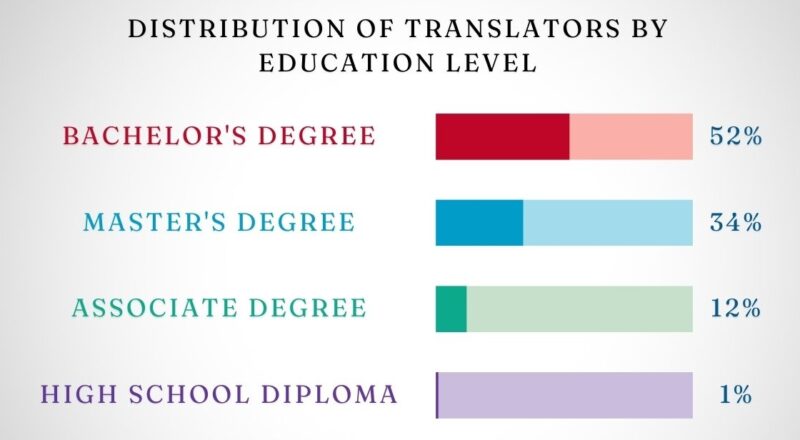The demand for skilled business translators is on the rise, with the U.S. Bureau of Labor Statistics projecting about 7,500 job openings annually over the next decade. This growth is driven by globalization and the need for businesses to communicate across diverse markets.
As companies expand internationally, the role of translators becomes crucial in facilitating clear and effective communication as stated by bls.gov.
Translators find opportunities across various industries, each offering unique roles and environments. Understanding the distribution of employment can guide aspiring translators toward sectors that align with their interests and skills.
The table below presents data on the employment sectors for translators:
| Industry | Employment Percentage |
|---|---|
| Professional, Scientific, and Technical Services | 2.12% |
| Elementary and Secondary Schools | 0.12% |
| General Medical and Surgical Hospitals | 0.08% |
| Local Government, excluding Schools and Hospitals | 0.06% |
| Employment Services | 0.05% |
Source: Bureau of Labor Statistics
This data highlights the diverse fields where translators are employed, with the Professional, Scientific, and Technical Services sector leading in employment opportunities. Aspiring translators should consider these sectors when planning their career paths.
Optimal Academic Path for Future Business Translators

Pursuing a bachelor’s degree in a foreign language or linguistics is a common starting point. Such programs provide a deep understanding of language structures, cultural nuances, and communication strategies.
As stated by Indeed.com, earning a bachelor’s degree in your chosen language is ideal to become a translator.
Courses in business, international relations, or economics can be beneficial, as they offer insights into the terminology and concepts prevalent in business settings.
Combining language studies with business-related courses equips aspiring translators with the specialized knowledge required for business translation.
Understanding the educational backgrounds of professional translators can provide valuable insights for aspiring individuals in the field.
The following chart presents data on the educational attainment of translators:

Essential Skills and Competencies for Business Translation

Proficiency in at least two languages is crucial. This includes not only fluency but also an understanding of regional dialects, idiomatic expressions, and cultural contexts. According to Montclair State University, the industry is increasingly looking for qualified translators and interpreters.
Strong writing skills in the target language are essential to convey messages accurately and effectively. Attention to detail ensures that translations are precise and free from errors.
Cultural competence allows translators to navigate and convey cultural nuances appropriately. Familiarity with business terminology and practices is vital, as it enables translators to understand and accurately translate industry-specific content.
Technological proficiency, including the use of Computer-Assisted Translation (CAT) tools and terminology databases, enhances efficiency and consistency in translations.
The Role of Advanced Degrees in Translation Careers
Obtaining a master’s degree in translation or a related field can enhance job prospects. Graduate programs often offer specialized courses in areas such as legal, medical, or technical translation, providing in-depth knowledge and skills.
The American Translators Association reported that 46% of their members held an M.A. in 2016. Advanced degrees also offer opportunities for research, internships, and networking, which can be invaluable in building a successful career.
Some positions, especially those in international organizations or academia, may require or prefer candidates with advanced degrees. Pursuing higher education demonstrates a commitment to the profession and a dedication to achieving a high level of expertise.
Certifications and Professional Development for Translators
Professional certifications, such as those from the American Translators Association (ATA), can validate expertise and improve employment opportunities. Certification involves passing rigorous exams that assess proficiency in specific language pairs and subject areas.
As stated by the ATA, certification is a testament to a translator’s professional competence.
Continuing education is also important, as language and industry standards evolve. Attending workshops, conferences, and seminars helps translators stay updated with the latest developments and best practices.
Engaging in lifelong learning ensures that translators maintain and enhance their skills, keeping them competitive in the job market.
Gaining Practical Experience in Business Translation

Internships and volunteer work provide hands-on experience, helping to build a strong portfolio and network within the industry. Many educational programs offer internship opportunities with businesses, non-profits, or government agencies, allowing students to apply their skills in real-world settings.
Volunteering for organizations that require translation services can also be beneficial.
Practical experience is invaluable in developing translation skills. Building a diverse portfolio showcasing various types of translation work can demonstrate versatility to potential employers or clients.
Networking with professionals in the field can lead to job opportunities and collaborations. Joining online forums, attending industry events, and participating in professional associations can facilitate these connections.
For instance, Elmura Linguistics, with over 20 years of experience providing translation and interpretation services in more than 200 languages, offers opportunities for aspiring translators to gain practical experience and industry exposure.
Networking and Professional Associations in the Translation Industry
Joining professional associations offers access to resources, job listings, and industry events, facilitating career growth and development. Organizations such as the American Translators Association provide directories of certified translators, which can lead to job referrals.
They also offer professional development resources, including webinars, publications, and certification programs. Networking through these associations allows translators to connect with peers, mentors, and potential clients.
As stated by the ATA, membership provides opportunities for collaboration and knowledge sharing. Engaging in these communities can lead to mentorship opportunities, collaborative projects, and increased visibility in the industry.
Active participation in professional associations demonstrates a commitment to the field and adherence to ethical standards.
Conclusion
Aspiring business translators should pursue relevant education, develop essential skills, gain practical experience, and engage with professional communities to build a successful career. The path involves continuous learning and adaptation to the evolving demands of global communication.

